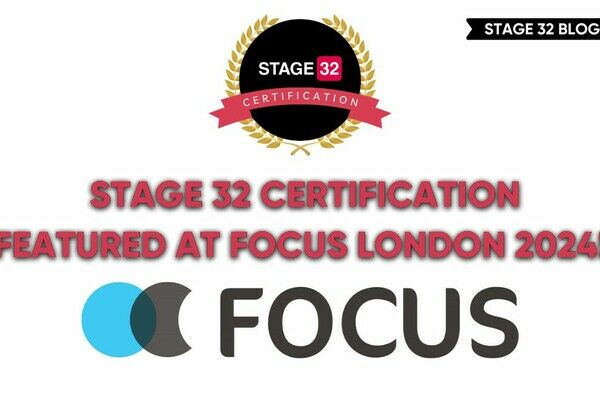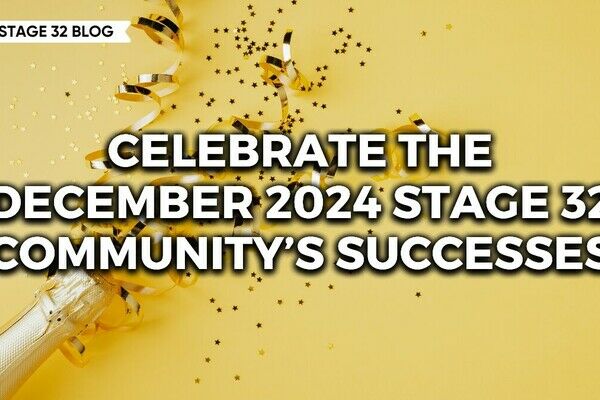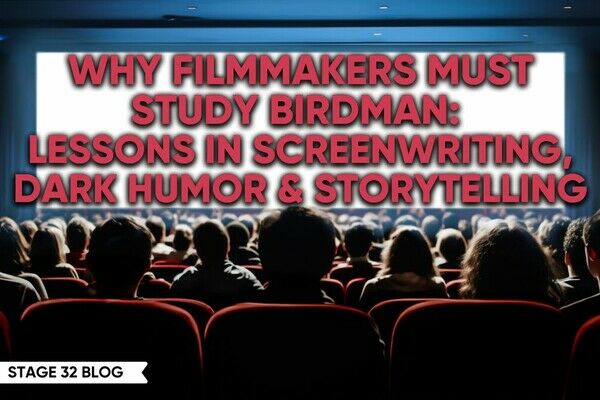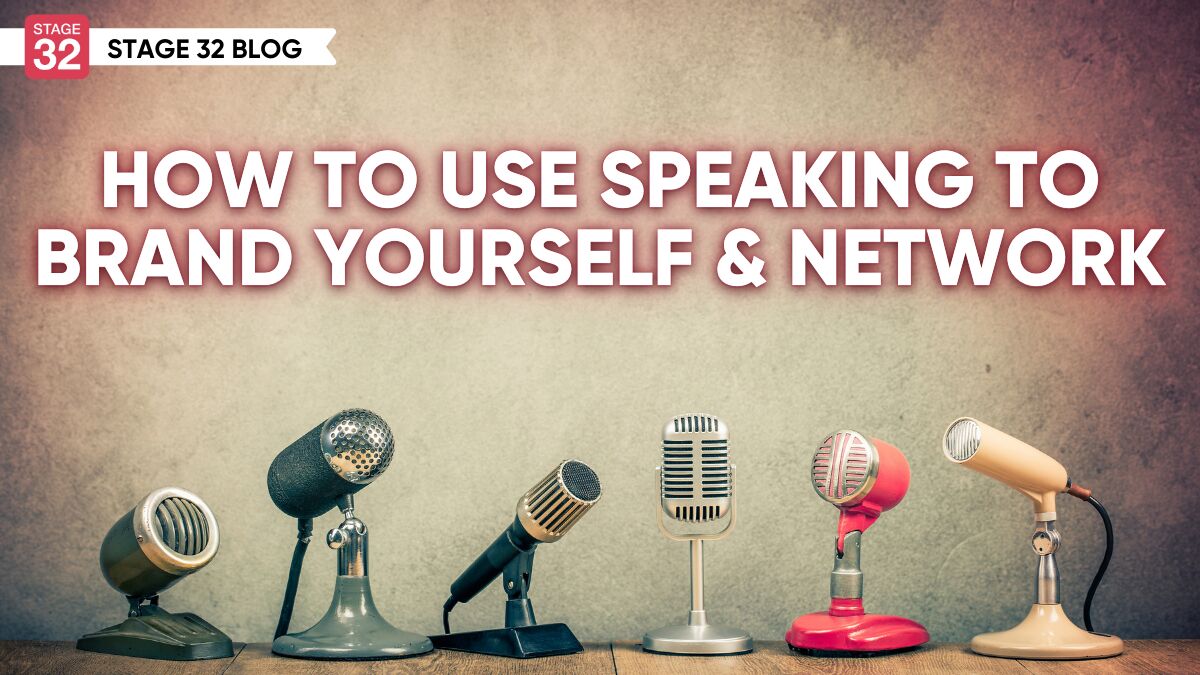How To Handle Advice and Critique
Happy New Year, Stage 32! Last month, I wrote a pilot and a feature in my labors as a script doctor and ghostwriter… and in the final tally, I wound up writing 6 pilots and nine features in 2021. Just one of these films was under my own name.
Going into 2022, my goal is to make enough headway with my own spec sales, films in development, and transmedia projects that I can charge more, work less, and focus on what I have to give the audience. If I can get my sci-fi heist feature into production, start illustrating my transmedia family sci-fi project, and sell some screenplays along the way, I will feel very good about where 2022 ends up professionally. Phasing out the paid services I’ve been performing for producers and writers in the community also means I’ll have more time for free services, like the blogs I write for Stage 32.
In the meantime, I’ve been working as a screenwriting and industry mentor with an ongoing series of clients. I’m taking a mentorship with a social media exec, with the intention of replacing most or all of my sales prospecting with brand development. My mentor’s telling me there’s a simpler, cleaner way to find new business… and I really, really hope she’s right. For all these reasons, I’ve been thinking about how we know good advice from bad advice in this industry.

THE FEAR OF CHASING OUR TAILS
In my article on “DAVID LYNCH AND THE TWO HOLLYWOODS,” I talk about the line between the industry of making movies… and the industry of breaking into the industry of making movies. Giving people advice in Hollywood is a whole career path unto itself, and succeeding in that career doesn’t always have a lot to do with helping your clients succeed in their dreams and goals. To make money in this line of work, it might be enough just to maintain the public impression that your authority is real and that what you’re offering is valuable.
Doing that job doesn’t necessarily come with a lot of special qualifications. People have built fortunes on the advice they give to writers and other showpeople, without ever having built sustainable showbusiness careers of their own. In fact, most people wind up working in this field specifically because their career isn’t making the money they need. In my own case, that’s certainly true.
Writers, as well as actors and other creatives, can waste their whole careers chasing the arbitrary goals that other people in the industry have placed in our crosshairs. If we’re paying money to hear that advice in the first place, the financial cost of chasing bad advice can be enormous to a struggling writer. How do we know when it’s worth the hassle, and when we’re getting the runaround?
Well, there are basically three kinds of advice. Let’s look at them, break them down, and place them in context. My hope, by the end of this article, is to show you how to put any given piece of advice in a more objective context.

IDEAS
In my blog on “CASHING IN YOUR MILLION DOLLAR IDEA,” I tear down the notion that Hollywood is a marketplace of ideas. In any creative industry, people hone their craft because they are driven by ideas they need to express. Nobody needs more ideas in Hollywood, so ideas have no real value in Hollywood… and when someone steps into your life and tells you what you should be writing about, or what details could be changing to make your story better, that person is assuming that their ideas are on some level more valuable than yours. Unless the suggestions this person is making are supported by an underlying skill this person is trying to teach you, there’s not a lot of value in whatever this person is trying to offer.
What I’m saying here is that it’s one thing if a colleague is making a suggestion in order to illustrate a larger practice that will improve your writing. That person might be onto something. If this is someone who’s just hung up on the idea that an idea has value in and of itself, and that some ideas are more valuable than others, then it’s probably a safe bet that this person doesn’t have much experience with the craft of screenwriting. In fact, this person is probably clinging to the hope that the right idea will bring them success specifically because they don’t actually know how to build the kind of success they’re looking for.
If someone is buying lottery tickets every Friday night, don’t take financial advice from that person. Unless you’re talking to someone in marketing (because marketing is all about selling ideas), placing the value of ideas above the value of craft is an act of desperation. Avoiding the advice of these people will simplify your life, it will help keep you sane and balanced, and it will cost you nothing in the long run.

TOOLS
For decades, my composer and I have held one another to task when it comes to our discipline, our habits, and our ethics as showpeople. He’s from Queens, and I’m from Boston. He came from the New York metal and punk scene, and I’m a New England theater kid. Weakness in showbusiness is something we share a profound and comical lack of patience for… and very few things will get the both of us to gang up and gleefully rip a new asshole into some jerk’s ego faster than the phrase “All you gotta do is.”
You know the phrase I’m talking about. “Bro. All you gotta do is know your brand.”
“All you gotta do is get a manager.”
“All you gotta do is make a concept reel.”
If you bring that crap to my doorstep, all you gotta do is run faster than I can catch you. All you gotta do, if you must know, is produce a sustainable and ongoing series of amazing productions and build a strong, sustainable community that supports them. If someone is telling you there is a shortcut you haven’t discovered yet, that person thinks your career isn’t moving forward because you don’t know how Google works. Forget that person. Quickly.
If a person is showing you what works for them, because they’ve succeeded in the thing you are trying to do, that’s one thing. Sharing that tool is an act of generosity, whether or not you were already aware of the information they’re giving you. At the same time, tools like these aren’t going to change your life. Realizing that you’re not taking full advantage of the services available to you can be helpful. Maybe we can save some energy in our routine, and apply it elsewhere. Maybe we can make more of this or that ongoing effort. Maybe it’s a baby gamechanger, but it’s not something you can build a career on.
If someone is offering you a new tool as a friendly gesture, that’s certainly a reasonable spirit in which to receive that kind of advice. If someone expects gratitude, or some kind of quid-pro-quo, in exchange for information about the tools and resources of your trade, that person is failing to respect your experience and professionalism. If someone wants money to tell you “all you gotta do is,” there’s a real good chance you already know more about success in showbusiness than they do.

HABITS
Five out of seven decisions we make are unconscious. If something’s not working in our career, it’s overwhelmingly likely that our habits are the problem. If someone is advising us to develop new habits, that person is troubleshooting in the right place.
With that said, developing new habits is very time intensive, it’s exhausting, and it’s always possible that we’re going to replace constructive practices with less advantageous ones. Spotting the habits that will advance our craft and maximize our productivity is crucial… and by and large, those habits are going to be simpler than the habits we already have. If someone is telling you that you need to build a screenplay around a fifteen-point system, and that you need to learn a new story language to use that system effectively, that person is probably full of crap. If someone tells you that writing for actors means giving your characters actions and letting those actions drive the story, the beats, the tone, the themes, and so forth, then resisting that information on the basis of defending that fifteen point system might be just a little bit crazy.
Anytime someone offers you a systemic approach to a problem, the thing to do is to look for the core assumptions that drive that system. On the surface, a system for keeping your screenplay active and structured might look very much the same as a system built to get that screenplay to conform to a more arbitrary set of criteria… but the system that’s built to keep you focused on the action of your story is driving you towards a very simple practice. All it is, really, is a plan for keeping you disciplined. Figure out whether you’re looking at a plan for mastering simple practices, or a system that was created for the sake of having something to sell.
Find the core assumptions behind the habits you are being asked to learn. How many of them are there? Do you agree with them? Do they offer a system of thought that seems simpler and more truthful than the system you’re working with currently? If a new habit offers you more direct control over your fundamentals than you currently have, then learning it will probably seem scary. Learn to recognize that fear, and engage it. If you keep mastering the habits that make you feel that way, your work and your career will continue to evolve right before your eyes.

SIMPLE AND EASY ARE NOT THE SAME THING
If finding success in entertainment was as simple as finding the right loophole or getting a subscription to the right website, then every person with a million dollar idea would be running a studio. When someone pushes us towards the easy answers, at the expense of the simple ones, it’s a very clear sign that this person has nothing of substance to offer the industry. Maybe that person has power or money we need, and it’s certainly true that a person can bring more to this industry than just their craft…
…but please, do not sacrifice the quality of your craft to people like this. Know that someone who doesn’t understand what’s good about you, your work, or your contributions to the industry isn’t going to suddenly see things clearly just because you’ve validated their egos or their approach to the industry. Keep your focus unerringly on your fundamentals, and that focus will keep you honest.
Many, many times on this blog, I’ve said that anybody who’s asking you to focus on something other than the strength of your craft or the strength of your community is selling something. If you ever get the impression that my advice is steering you away from the practices that keep your filmmaking and your film community strong, then that same standard applies to me. Keep your fundamentals in front of you, lose the number of anyone who tries to pry them out of your hands…
…and when someone comes along with information that suggests success in showbusiness might be simpler and more challenging than you had previously dared to imagine, put your discipline to the test. Show up, find out what that person has to say, and learn how to do what they do. Make the most of their time and their effort, because that person is trying to make the most of yours.
About Tennyson E. Stead

Tennyson E. Stead is a master screenwriter, a master worldbuilder, and an emerging leader in New Hollywood. Supported by a lifetime of stagework, a successful film development and finance career, and a body of screenwriting encompassing more than 50 projects, Stead is best known for writing an edgy film industry satire called Making the GAMP for director Michael Wohl, as well as a dark future gladiator tentpole film called Atlas Uprising for Endgame Entertainment. In collaboration with producer Lucinda Bruce, Stead is writing and directing a female-led, sci-fi heist movie called Quantum Theory. When Stead is not writing and directing feature films he’s doctoring screenplays, working in the Los Angeles theater scene, developing content for gaming and transmedia, and blogging for Stage 32. Here’s a list of the articles Stead has written for the Stage 32 community:
More Stage 32 Articles by Tennyson:
REALITY CHECKS FROM AN INSPIRATIONAL CRIPPLE: Part I
REALITY CHECKS FROM AN INSPIRATIONAL CRIPPLE: Part II
HOW WE SCREWED THE SHOWBIZ CULTURE UP - AND HOW WE CAN FIX IT
WHAT IS SPECTACLE IN FILMMAKING - AND HOW CAN INDIE FILMMAKERS USE IT?
WHY I PASSED ON THAT SCREENPLAY
CASHING IN YOUR MILLION DOLLAR IDEA
HOW I SURVIVED THE HOLLYWOOD CRASH
THE GHOSTS OF SHOWBUSINESS PAST
HOW TO GET LEGENDARY PERFORMANCES FROM ACTORS
CRAFTING A FILM COMMUNITY BUILT ON SUPPORT
HOW TO FIND MONEY FOR MOVIES: FUNDRAISING
HOW TO FIND MONEY FOR MOVIES: FINANCING
HOW TO WRITE STRONG, DIVERSE CHARACTERS
LET'S TALK ABOUT AUTEUR THEORY
WHERE ICONIC FILM SCORES COMES FROM
HOW TO HACK THE AUDITION PROCESS
DAVID LYNCH AND THE TALE OF TWO HOLLYWOODS
HOW TO BUILD A UNIVERSE FROM SCRATCH
PAYING RENT WITH THE POWER OF SCREENWRITING
INSPIRATION AND THE WILL TO WORK
CAN SOMEONE TELL ME WHAT PRODUCERS EVEN DO?
3 THINGS I WISH THEY TAUGHT IN FILM SCHOOL
HOW TO CURE WRITERS BLOCK WITH ACTIVE STRUCTURE: PART ONE
HOW TO CURE WRITERS BLOCK WITH ACTIVE STRUCTURE: PART TWO
HOW TO MAKE MONEY IN SCREENWRITING WITHOUT REPRESENTATION
HOW TO ADAPT STORIES FROM THE PAGE TO THE SCREEN
Let's hear your thoughts in the comments below!
Got an idea for a post? Or have you collaborated with Stage 32 members to create a project? We'd love to hear about it. Email Taylor at taylor@stage32.com and let's get your post published!
Please help support your fellow Stage 32ers by sharing this on social. Check out the social media buttons at the top to share on Instagram @stage32 Twitter @stage32 Facebook @stage32 and LinkedIn @stage-32
Take Stage 32 with you! Download the Stage 32 app for iOS here.
| How to Attract Allies in the Film Industry: The New Approach to Goal-Setting |
| How to Use Speaking to Brand Yourself & Network |
Search Stage 32 Blog
There are now 3693 blog posts for you to enjoy. Search them all by tags below.
Acting, Advice, Cinematography, Coffee & Content, Composing, Contests, Distribution, Featured, Filmmaking, Financing, Inspirational, Networking, Producing, Screenwriting, Success Stories, Tips, Trending,Relevant Tags
Recommended Articles

The [Ultimate] 5-Step Sound Guide for Great Sound on Set

The 3 Step Process To Unlock Your Creativity

Stage 32 Certification at Focus London 2024!

The Economics of Short Films

Setting Intentions for the New Year: Creating My Mid-Life Peace (No Crisis Welcome!)

Time To Breakout Of Creative Blocks

Announcing the 10th Annual Short Film Contest

Celebrate the December 2024 Stage 32 Community’s Successes

Why Filmmakers Must Study Birdman: Lessons in Screenwriting, Dark Humor, and Storytelling






